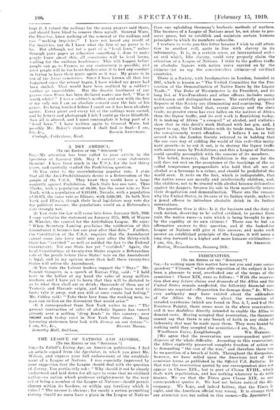THE LEAGUE Ole' NATIONS AND ALCOHOL.
fTo THE EDITOR or TEE " SPECTATOR.")
Stn,—In LitteWs Living Age, an American publication, I find 1111 article copied from the Spectator, in which you greet Mr. Wilson, aml express your fell endorsement of the establish- ment of a League of .Nations. I was especially impressed by your suggestion flint the League should deal with the question of slavery. You pertinently ask "Why should it not be clearly hzulerstood and laid down for all ages to come that no civilised nation—no station which professes enlightenment by the very act of being a member of the League of Nations—should permit slavery within its borders, or within any territory which it rules ?" The answer is obvious: for surely a nation permitting slavery should no more have a place in the League of Nations
than one upholding Germany's barbaric methods of warfare. The business of a League of Nations must be, not alone to pre- serve peace, but to establish and maintain certain humane principles to which its members subscribe.
I venture to write you this letter because I wish to call atten- tion to another mil, quite in line with slavers, in its inhumanity. It is, in a certain sense, an international evil— an evil which, like slavery, could very properly claim the attention of a League of Nations. I refer to the godless traffic, in alcoholic liquors with native races carried on-by tho citizens—let us say the conscienceless citiseni—of civilized coo tit ries.
There is a Society, with headquarters in London, founded in 1687, -which is known as "The United Comniittee for the Pre- vention of the Demoralisation of Native Races by the Liquor Tragic." The Duke of Westminster is its President, and its long list of Vice-Presidents and other officers includes many well-known and distinguished names. The carefully prepared Reports of this Society are illuminating and convincing. They quite confirm the belief that, except slavery and the :dare trade, no greater curse has ever fallen on the natives of Africa than the liquor traffic, and its evil work is flourishing to-day. It is making of Africa "a cesspool" of alcohol, and statistics show that in this devil's work Holland with her gin, and, I regret to say, the United States with its trade man, have been
the conspicuously worst offenders. I believe I am in full accord with the London Society referred to in holding that the one sure way of ridding the world of this evil—this malig- nant growth—is to cut it out, is to destroy the liquor traffic with native races by Prohibition; and this a League of Nations could speedily accomplish with the consent of its members.
The belief, however, that Prohibition is the cure for the evil does not rest on the acceptance of the teachings of the so- called temperance propagandists who hold that all use of alcohol as a beverage is a crime, and should be prohibited the world over. It rests on the fact, which is indisputable, that the native races are morally and intellectually children, and, like children, not to be trusted with alcohol because defenceless against its dangers, because its sale to them manifestly means their despoliation and demoralization. These are the reasons why the United States, in its care of its Indian wards, makes it a penal offence to introduce alcoholic drink in its Indian reservations.
The question then is this: Is it the business and the duty of each nation, deserving to be called civilised, to protect front rain the native races—a ruin which is being brought to pass by the cupidity- of its own citizens ? There can be but en affirmative answer to this question, and if the looked-for League of Nations will give it this answer, and make, such answer an established principle of the League, it will mean a long step forward to a higher and more humane civilization:-


































 Previous page
Previous page